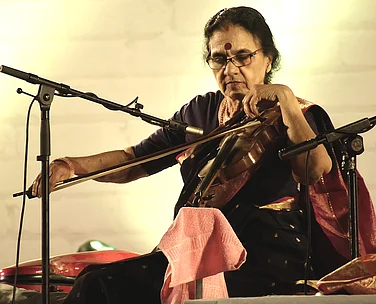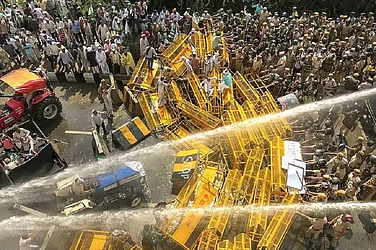Ironically, the Congress is the closest it has ever been to pulling off a major electoral coup and there's little doubt that the ruling Left Front faces its stiffest challenge in 1996 in the state it has ruled undisturbed for 18 years. Pointing to the Congress' favourable prospects, a professor of political science in Calcutta University says: "The number of warring factions within the major opposition party is down to only two, from three or four groups earlier. And the BJP, which picked up 11.47 per cent of the total votes polled in 1991, should not be able to win more than 5 to 6 per cent if the recent civic and panchayat polls are any indication. In 1991, the BJP had made the Congress defeat easier by influencing its candidates' chances in 30 assembly seats, which would otherwise have given the Congress a respectable tally of 73 seats in a house of 294, as against the 43 it eventually won. And as far as the Left goes, senior leaders like Nripen Chakravarty and Benoy Choudhury have criticised their own party publicly. Conditions look tailor-made for the Opposition in 1996."
Encouraging words for a party which has remained politically subdued for 18 years in West Bengal. Its tally in the assembly has fluctuated between 20 and 43 seats in the course of four elections, even though it has consistently managed to win between 35 and 42 per cent of the total votes polled. The bane of the party has been its chronic inability to translate political support into sizeable legislative presence. Personal bickerings and sellouts to the ruling Front have combined to land the party in a position where it has failed to live up to expectations.
With elections at hand, prominent Congressmen are engaged in analysing their prospects. Dr Zainal Abedin, veteran leader of the legislative party, and Saugata Ray, who has the best track record in the assembly, do not share their supporters' optimism about their prospects. Ray, who sympathises with Banerjee, says: "If people think the situation is better because there are only two factions instead of more, I don't agree. The PCC will not let too many of our men secure assembly poll nominations, going by our experience prior to the 1995 civic polls. They cannot stomach the popular support our people enjoy. After all, Banerjee's massive January rally where the Prime Minister was present, was a landmark for the party. The Front may be on the ropes this time, but I can't think in terms of victory yet."
Abedin, who aligns with the PCC chief Mitra, counters: "The other side is full of ambitious people who do not shoulder the rigours of party organisational work. Howcan we nominate people on their recommendation? From west Dinajpur to Burdwan, I can give you examples where we lost safe seats because we accepted their people. Sometimes they recommend tickets even for criminals. A united party could turn the tables against the Front this time, but I don't see any signs of that happening."
If anything, the attempted re-entry of Union minister Pranab Mukherjee and former chief minister S.S. Ray has created further confusion in the party ranks. Their return has not been generally welcomed, although Mukherjee seems better placed in the run-up to the polls than S.S. Ray. He enjoys the support of the PCC, and Abedin recalls with gratitude his financial help to the organisation during the panchayat polls in 1993, where the Congress won more mass support than before and resulted in a 20 per cent loss of popular support for the Left, as well as the civic polls where the party wrested control of 32 civic bodies out of 127. But the AICC hardly took notice, leaving both camps disillusioned with the high command. "Why Delhi never intervenes is a mystery, even though our party enjoys more mass support here than it does in Uttar Pradesh or Bihar," complain Abedin and Saugata Ray.
Unfortunately, both S.S. Ray, who last won an election in 1972, and Mukherjee, who has yet to win a Lok Sabha seat, are better known for their affiliation with the central leadership than with the state unit. In the common perception, let alone the CPI(M)'s, both men have carried out policies against West Bengal's interests, on orders from above. S.S. Ray's tenure is infamous for the open season declared by the police on opposition workers from 1972 to 1977, while Mukherjee is associated with the decision to withhold a Rs 325 crore special assistance to West Bengal, despite a recommendation from the Finance Commission. Mukherjee, according to his confidants, would naturally like to lead the state Congress as would S.S. Ray, which would pit the two against each other. S.S. Ray has nestled closer to the Banerjee camp. In short, neither has been able to rise above petty factionalism. And until they do, their dream to rule their native state will remain just that.






















